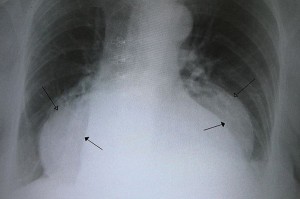Hiatal Hernia is coined from the words hiatal meaning a small break or interruption, and hernia, which means rupture. Hiatal Hernia (another term used is Hiatus Hernia) is a condition in which a part of the stomach protrudes towards the chest cavity through the esophageal opening in the diaphragm.
The diaphragm is a thin sheet of muscle located below the heart and lungs that separates the chest from the abdomen. Normally, the diaphragm has a small opening called esophageal hiatus, this opening allows the esophagus to pass its way through towards the stomach, but in some cases the stomach pushes its way up towards that opening and causes a hiatal hernia.
A small hiatal hernia doesn’t cause any pain or discomfort. Almost 15 % of the human population has it and only a few are afflicted with minor symptoms. This condition is mostly common on infants, people who smoke, those who are obese and individuals over 50 years old.
There are two types of hiatal hernia:
• The sliding hiatal hernia is the most common type of hiatal hernia. This occurs when the junction between the stomach and the esophageal area together with a small portion of the upper part of the stomach slides up to the diaphragm towards the chest cavity. The herniated part of the stomach would just eventually go back to its normal position after a few seconds.
• The rolling hiatal hernia or sometimes called paraesophageal hiatal hernia. This type of hiatal hernia occurs when a part of the stomach squeezes its way up to the chest cavity leaving behind the esophageal junction into its normal location. Though this is a less common type of hernia, it may occur without any symptoms and may cause great danger. The stomach that got stuck might get strangled thus obstructing or shutting off the blood supply.
Causes or Risk Factors of Hiatal Hernia
It’s really hard to pinpoint the main cause of hiatal hernia. The cause is unique for each individual. However, there are number of factors that cause this type of condition, and they are:
• Improper lifting
• Injury at the area
• Tight clothing
• Improper posture like slouching
• Pregnancy and Delivery
• Obesity
• Smoking
• Increased pressure around the abdomen area like hard coughing and vomiting
• Constipation
• Hereditary influence
• Drug use like cocaine
• Diaphragm weakness
• Poor diet that causes swelling on the ileocecal valve which causes indigestion and leads to pressure in the abdomen.
• Emotional stress causes a person to repress his/her anger and when the anger is not released, it causes the stomach to stay up.
Signs and Symptoms of Hiatal Hernia
Hiatal hernia is often times called the “great mimic” because its symptoms are quite similar to a number of disorders. Hiatal hernia doesn’t always show any signs or symptoms, but in some cases they occur from mild to severe types of symptoms. Here is a list of symptoms associated with hiatal hernia:
• Burning sensation (heartburn)
• Chest pain
• Nausea
• Vomiting
• Difficulty in swallowing
• Belching
• Coughing
• Regurgitation
• Abdominal discomfort
• Hiccups
• In the case of paraesophageal hiatal hernia, especially with strangulated hiatal hernia, severe pain is experienced; as such, it is considered a serious illness that needs to be treated right away
Test and Diagnosis of Hiatal Hernia
Personal Examination
A way to check if you have a hiatal hernia is through placing your fingers below the breastbone or the solar plexus. While taking a deep breath, feel your solar plexus expand while moving upward. If you can’t feel any movement from your solar plexus your more likely to have hiatal hernia.
Medical Examination
In some cases you need to run some series of tests to determine what type of hiatal hernia you have, how serious your condition is, and if it is life-threatening or not. A complete physical examination should be tested, checking your pulmonary, digestive, and cardiovascular system. Rectal and stool test would also be necessary to check any internal bleeding.
• Initial test
o Electrocardiogram (ECG)
o Chest x-ray
o Blood test
o Other test for cardiovascular and pulmonary organ
• Follow-up test
o Barium swallow or upper GI x-ray
o Esophagogastroduodenoscopy (EGD)
Treatment for Hiatal Hernia
Self treatment
Here are some self adjustment techniques;
• First thing in the morning drink a pint of water. While standing on your toes, suddenly drop on your heels and repeat these several times.
• When lying down, slightly elevate the head part.
These methods have no guarantee but on mild cases it might loosen up the hernia down to its normal position.
Medical treatment
On most cases symptoms do not occur to individuals diagnosed with hiatal hernia, so medical treatment is not necessary but when symptoms appear its best to consult your doctor for the right medication. For severe type of hiatal hernia, a surgical procedure might be the last option and the procedure is called Nissen fundoplication.
Prevention of Hiatal Hernia
Try to avoid the risk factors that cause hiatal hernia. For instance, if you’re obese, then lose some weight. Try to avoid severe physical exertion, and keep a healthy stress-free lifestyle.

Hi are using WordPress for your site platform? I’m new to the blog world but I’m trying to get started and set up my own. Do you need any coding expertise to make your own blog? Any help would be really appreciated!